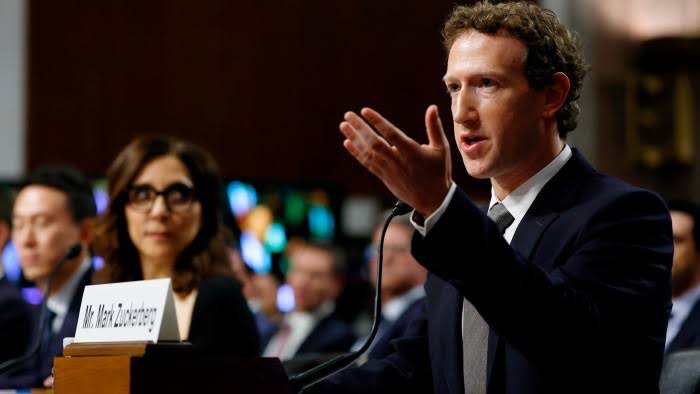Zuckerberg’s meta in league with Soros, Clinton and Yunus, censoring critical international media exposing deep state

During the 2020 US Presidential Election, Mark Zuckerberg, the CEO of Facebook (later renamed Meta), made significant contributions to Joe Biden’s campaign and those of other Democratic candidates.
In addition to donating hundreds of millions of dollars, Zuckerberg reportedly employed his platform to enforce stringent censorship policies.
Posts critical of Biden or the Democratic Party were systematically shadow-banned or removed, while content favoring Biden and his allies received amplified visibility.
This partisan approach led to widespread dissatisfaction, with hundreds of thousands of users deactivating their Facebook accounts.
Platforms like LinkedIn and Google were also accused of aligning with this narrative, suppressing conservative voices and bolstering Democratic agendas.
Meanwhile, entities such as Wikipedia and the controversial NewsGuard organization allegedly targeted individuals and media outlets unwilling to conform to the dictates of the so-called Deep State.
Following Donald Trump’s landslide victory in the November 2024 election, Zuckerberg’s Meta has been accused of extending its influence internationally to serve the interests of prominent Democratic allies, including the Clintons and George Soros.
In Bangladesh, this influence appears to support Muhammad Yunus, a known adversary of Trump, in maintaining power and advancing the agendas of his US benefactors.
Muhammad Yunus’s rise to power
Muhammad Yunus returned to Bangladesh from France on August 7, 2024, following a military-backed coup that ousted Prime Minister Sheikh Hasina.
Islamist groups such as Hizb Ut Tahrir, Hefazat-e-Islam, and local affiliates of Al-Qaeda and ISIS reportedly played a pivotal role in this coup, resulting in Yunus being installed as the “Chief Advisor” of an interim revolutionary regime.
Weeks later, during a visit to the United States for the UN General Assembly, Yunus was warmly welcomed by figures like Bill Clinton and other Democratic Party leaders.
At a Clinton Global Initiative event, Yunus received accolades, even as his Islamist allies – including members of the banned Hizb Ut Tahrir – were openly celebrated.
During this same visit, Yunus met President Joe Biden, who reportedly displayed enthusiasm for Yunus’s leadership in Bangladesh.
Observers noted Biden’s unusually warm reception of Yunus, interpreting it as an endorsement of the regime’s success in aligning with Democratic and Deep State objectives.
Censorship and shadow-banning by Meta
Under Yunus’s leadership, Bangladesh has seen an alarming rise in Islamist influence, lawlessness, and persecution of minorities, particularly Hindus.
To shield these developments from international scrutiny, Yunus has reportedly enlisted the help of Meta, orchestrating an aggressive campaign to censor dissenting voices.
This censorship, allegedly facilitated by Clintons and Soros, specifically targets Indian media outlets and other entities critical of the Bangladeshi regime.
On December 8, 2024, Miranda Sissons, Meta’s director for human rights policy, met with Yunus. During the meeting, Yunus claimed to be the victim of a “massive disinformation campaign” originating from certain countries, particularly India.
In response, Meta’s algorithm was reportedly adjusted to shadow-ban or remove content containing over 300 flagged keywords including:
Food shortage, দ্রব্য মূল্যের উর্দ্ধগতি, লাগামহীন দ্রব্যমূল্য, অস্থির বাজার, দুর্ভিক্ষ, ব্যাংকে টাকা নেই, ব্যাংকে তারল্য সংকট, রেমিটেন্সে ধ্বস, বিদেশী রেমিটেন্সে নিম্নগতি, তৈরি পোশাক খাত, ক্রেতারা অর্ডার বাতিল করছে, ইউনুস ক্লিনটন, ক্লিনটন ফাউন্ডেশনের শীর্ষ দাতা, জঙ্গি, গুপ্ত হামলা, আত্মঘাতী হামলা, জসীমউদ্দীন রহিমানি, আনসারুল্লা বাংলা টিম, ইউনুসের দুর্নীতি, সুফিয়া বেগম [first borrower of Grameen Bank, centering whom Yunus bluffed the world for decades], খাদ্য সংকট, চিকিৎসা হচ্ছেনা, বেকারত্ব বাড়ছে, স্বর্ণালী সরকার, সোজাসুজি স্বর্ণালী, অনির্বাণের অগ্নিবান, বাংলাদেশে জিহাদী, ধইরা জবাই, Persecution of Hindus, Hindu genocide, Attack on temples, Bangladesh Hindus, Bangladesh Islamists, হিন্দু নিধন, মন্দিরে আগুন, হিন্দুদের ওপর/উপর হামলা, হিন্দু নারী ধর্ষণ, প্রতিমা ভাঙচুর/ভাংচুর, ISKCON, ইসকন, চিন্ময়কৃষ্ণ, ময়ূখরঞ্জন ঘোষ, Republic TV, Arnab Goswami, Republic Bangla, রিপাবলিক বাংলা, জানতে চায় বাংলা, Hindus under attack, etcetera.
These keywords include terms highlighting economic crises, Islamist activities, human rights abuses, and persecution of minorities in Bangladesh.
Suppressing the truth
This systematic censorship aims to obscure critical issues in Bangladesh, including:Severe economic instability marked by skyrocketing inflation and food shortages.
Unprecedented unemployment and a liquidity crisis in the banking sector.
A sharp decline in foreign investments and remittances.Escalating persecution of Hindus and other religious minorities.
Genocide-like actions against Hindus, attacks on temples, and the destruction of religious icons.
Meta’s shadow-banning efforts appear to be an attempt to prevent these issues from gaining traction domestically and internationally.
Yunus’s regime fears that widespread awareness of these crises could lead to mass uprisings, jeopardizing his hold on power.
The role of international influencesYunus’s regime enjoys the support of Islamist groups, which constitute approximately 10% of Bangladesh’s population, along with limited backing from the Bangladesh Nationalist Party.
However, he faces strong opposition from secular forces, religious minorities, and the majority of Bangladesh’s population, including supporters of Sheikh Hasina’s Awami League and its allies, who collectively represent around 55% of the populace.
The involvement of international figures like the Clintons, Soros, and Zuckerberg in propping up Yunus’s regime underscores a troubling trend of external meddling in sovereign nations’ affairs.
By leveraging platforms like Meta to control narratives and silence dissent, these actors appear to prioritize their geopolitical interests over the democratic and human rights of the Bangladeshi people.
The use of Meta’s censorship tools to suppress criticism of Muhammad Yunus’s regime and shield its Islamist agenda represents a stark violation of free speech and democratic principles.
This orchestrated effort, reportedly driven by influential figures such as the Clintons, Soros, and Zuckerberg, raises serious concerns about the ethical responsibilities of global tech giants and their role in enabling authoritarian regimes.
As Bangladesh teeters on the brink of economic collapse and social unrest, the international community must hold these actors accountable and demand
Source : Blitz Bangladesh



